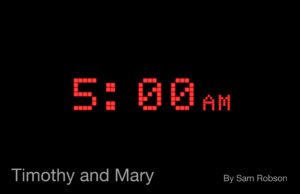
The Banishment of Carrots:
A Collection of Works About Dementia
Sam Robson, 2012
Featured project in the 2016 Thesis Showcase Series,
“Oral History: From Creation to Interpretation”
In “The Banishment of Carrots,” Sam Robson reflects on the ethical considerations and creative approaches surrounding the process of conducting oral histories with people who have experienced memory loss.Drawn from reflections on his father’s experience with Alzheimer’s disease, Sam explores the intersections of oral history, narrative medicine, and memory loss. The Banishment of Carrots experiments with method and form, alternating between personal reminiscences, play scripts, and a book excerpt. From ethical quandaries to the Institutional Review Board, spanning longitudinal interviews and caregiver outings, Sam’s opening chapters investigate essential questions about what happens to the stories of people who suffer from memory loss:
- Where do they go?
- To whom are they important, if anyone?
- What are different people’s stakes in the telling and retelling of these stories?
- How do people close to Alzheimer’s sufferers relate to these stories?
- What stories do caretakers and Alzheimer’s sufferers decide to remember, and why?
- How is the past constructed by people with memory loss, and how do those close to them interact with that construction?
- How do we talk about silences in the context of memory loss?
- What significance does storytelling have in the context of memory loss?
Timothy and Mary includes an interviewer as a character the narrators interact with, but in a more conceptual way. The interviewer, 5AM—which one audience member pointed out looks a lot like “SAM”—asks questions sometimes to the point of agitation. His existence both validates and frustrates the storytelling of the characters, especially Timothy, who has Alzheimer’s.
His questions are fine until Timothy feels he has to defend himself against being portrayed as someone who has memory problems, explaining that he didn’t get lost on the way to the courthouse—okay, maybe he got a little turned around. In fact, 5AM caused him to become stressed about not having the right words when he called on the phone.
Sam mentioned this as an experience he personally had with an interviewee, reflecting on the impact an interviewer can have on someone with Alzheimer’s. 5AM also portrays the perspective of the interviewer, frustrated when the interview doesn’t seem to be working.
Upon first glance, Sam’s play seems to differ greatly from more traditional interview-based productions. It operates by fictional characters instead of specific representation. The creative portrayal of 5AM in the interviewer role is also unique. However, the essence of it as an oral history play stays the same: it gives a political message in a personal way. Timothy and Mary is not about major news events, but it aims to change the way society views people with Alzheimer’s. And that is just as political.
– Kate Brenner, OHMA 2014
